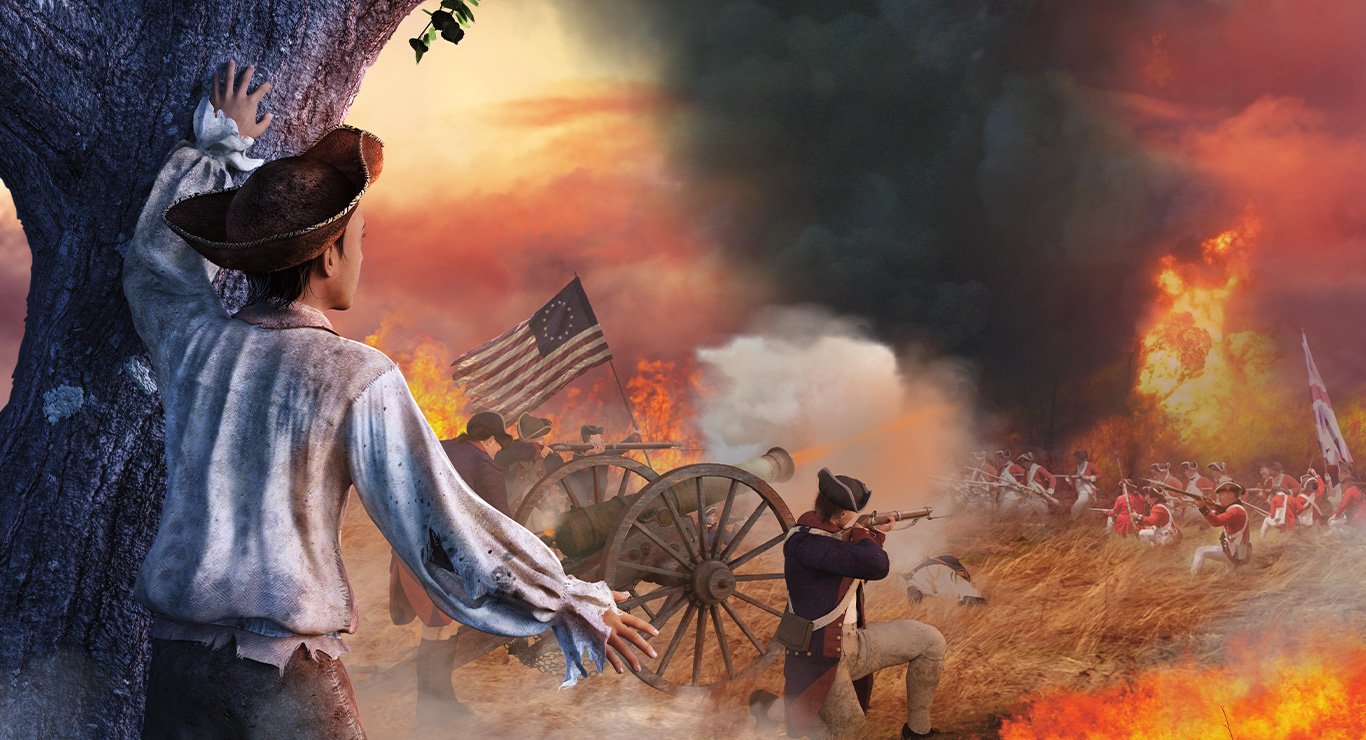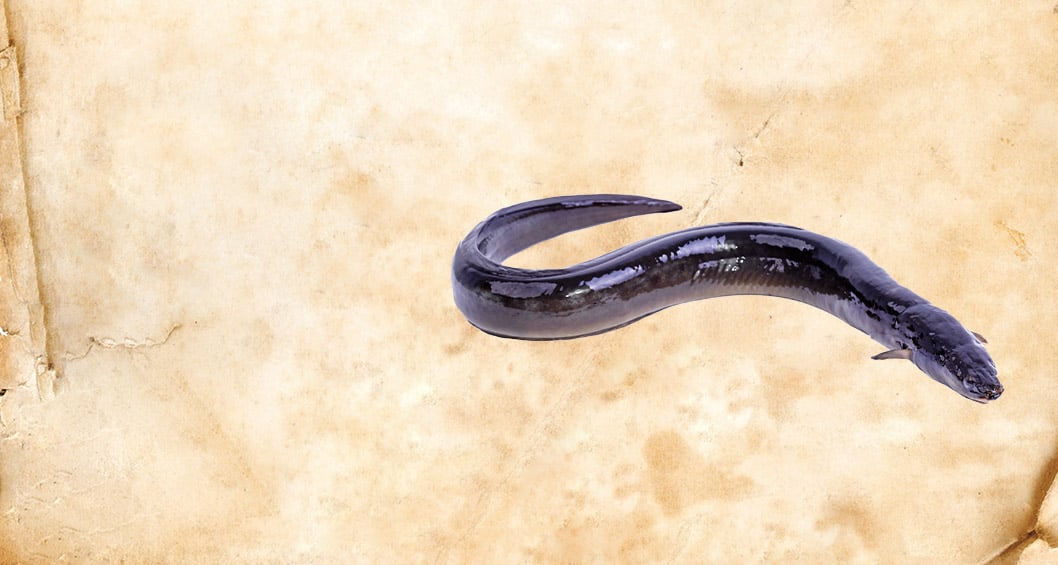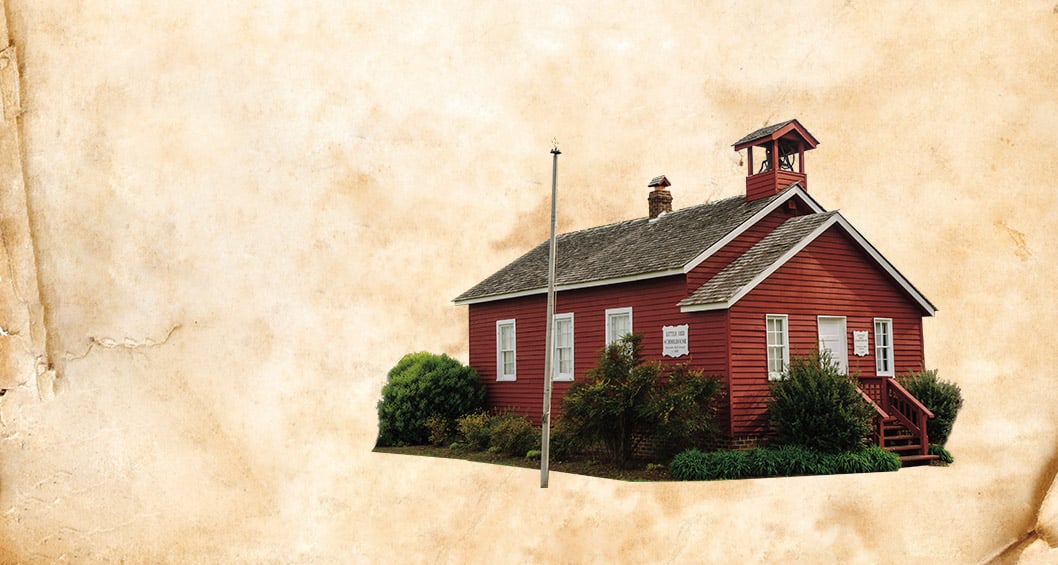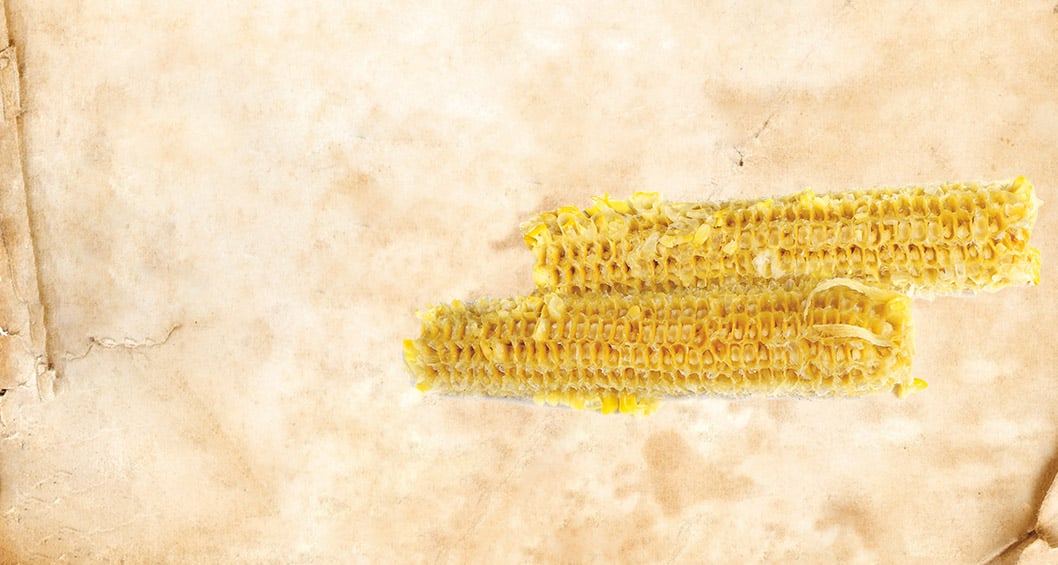As You Read: Look for details that help you understand what it was like to be a soldier in the Revolutionary War.



4. Read a Thrilling Story | Magazines+ Mini Unit
Blood, Smoke, & Freedom
Joseph Plumb Martin was still a boy when he became an American soldier. Could he survive his first battle?
By Lauren Tarshis | Art by Gary Hanna
Boom! Boom! Boom!
Cannon explosions shook the ground. Smoke filled the air. And 15-year-old Joseph Plumb Martin was lying in the dirt, trying to stay alive.
It was August 27, 1776. America and England were fighting the first big battle of the Revolutionary War, in Brooklyn, New York. Just three months before, Joseph had begged his family to let him join the American army. Being a soldier would be a thrilling adventure, he was sure. Of course America would win!
But now Joseph could see that the Americans were doomed. Hundreds of soldiers were dead. The cries and moans of wounded men rose up into the summer sky. It seemed Joseph had two choices: surrender—or die.
A New World
Joseph was born in 1760, when the United States wasn’t yet a country. Much of America was wilderness. Lined up along the East Coast was a strip of land owned by England. This land was divided into 13 separate areas known as colonies.
Steve Stankiewicz
The 13 Colonies
During the American Revolution, what would become the United States was only a group of colonies along the East Coast.
Joseph lived with his grandparents in the colony of Connecticut. His great-great-grandfather had settled there in the mid-1600s. He’d journeyed to America on a creaking wooden ship—3,000 miles across the Atlantic Ocean. Those early sea journeys lasted for several miserable months. Passengers suffered through ferocious storms. Rotting food. Biting rats. Killer diseases. Many died before ever reaching America.
But that didn’t stop thousands of people from heading to the New World, as America was called. They went because America promised a different kind of life. In England and across Europe, strict laws and old ideas controlled almost everything a person did—what prayers they could say, who they could marry, whether they were rich or poor, even who they could be friends with. These rules were like prison walls, trapping people into unhappy lives. No matter how hard a person worked, they couldn’t break out. But these rules and ideas didn’t reach all the way to America. A person could be freer there. No wonder people risked everything—even death—to get there.
By the time Joseph was born, hundreds of thousands of people of European descent lived in America.

If you lived in 1776
Life was different back in Joseph’s day. Here are just a few reasons why.








Shutterstock.com (eel, parchment); Mark Summerfield/Alamy Stock Photo (school house); The Colonial Williamsburg Foundation (shoes); Igor Kovalchuk/Alamy Stock Photo (corncobs)
Trouble Brewing
Not everyone thrived in the colonies. As more and more settlers arrived, hundreds of thousands of Native American people were killed. They died of diseases brought by European settlers, in fights over territory, of starvation after being forced from their homelands. African people were dragged to America in chains and enslaved by the settlers.
But for people like Joseph’s family—white and free—life was better than almost anywhere else in the world. Joseph had been sent to live with his grandparents when he was 7. They were wealthy and showered him with love.
Even as a kid, though, Joseph sensed that trouble was brewing. More and more Americans were angry with “Mother England.” They wanted more say over how laws were made in the colonies. They fumed at England’s king, George III. Why should he rule over America when he had never even been there? Some said the 13 colonies should tear away from England and become a new country.
National Galleries Of Scotland/Getty Images
That’s King George III. He was the monarch of Great Britain from 1760 to 1820.
Like a storm that spins into a hurricane, anger between America and England turned to rage. And then, on April 19, 1775, that rage exploded into war. Fighting broke out between Americans and British troops in and around the towns of Lexington and Concord, in Massachusetts.
The American Revolution had begun.

Launch the slideshow to explore a primary document.
“Seeds of Courage”
At first, the thought of fighting terrified Joseph. But soon, as he would later write in his memoir, “the seeds of courage began to sprout.” He begged his grandparents to let him join the new American army. And in June of 1776, they agreed. His grandmother packed his knapsack with clothing, cake, and cheese. His grandfather gave him a musket and a Bible. And Joseph sailed to New York City, which had been turned into a massive American army camp.
"I was now what I had long wished to be,” he wrote. “A soldier.”
Except Joseph wasn’t really a soldier—at least, not yet. And neither were most of the nearly 20,000 men and teenage boys who had joined the American army. Few had ever fought in a war before. Back home they were farmers, butchers, tailors, shop owners. Some barely knew how to fire a gun. Their leader, General George Washington, had never led an army before. All summer, he struggled to turn his ragtag group into a trained fighting force.
Massive Attack
Joseph didn’t complain about the endless marching and shooting practice. He choked down the army meals of corn mush, wormy biscuits, and tasteless meat. He coped with the sweltering summer heat and the stench of human waste that hung over camp.
Meanwhile, the British were plotting a major attack on New York. All summer long, British ships packed with soldiers and weapons had been streaming toward the city. British “redcoat” soldiers were the most feared in the world.
By August, more than 32,000 redcoats were camped on Staten Island, just five miles south of New York City. More than 400 British ships were anchored nearby. Seventy-three were warships, packed with cannons that could blast apart a city block in minutes.
Joseph could plainly see those warships lurking like caged beasts, hungry for blood and ready to strike. But he had no doubt that America would win any battle.
He was wrong. At the end of August, the British attack began. Even before any shots were fired, the Americans were doomed.
The British attack was brilliantly planned. In the predawn darkness, more than 15,000 soldiers began to creep toward Brooklyn, barely a mile across the river from New York City. Only a few thousand American troops were stationed there.
Most were hunkered down in six American forts—roughly made buildings protected by high walls and cannons. Others were on patrol across Brooklyn. All would be caught by surprise.
Over the next few days, Washington scrambled to send more men to Brooklyn. Joseph was one of them. He was rowed across the river—a trip of about an hour. His pockets were stuffed with hard biscuits, and his heart was filled with fear.
Steve Stankiewicz
The Battle of Brooklyn
Secret Escape
The moment Joseph stepped ashore, he saw a scene of horror: wounded men lying in the grass, “some with broken arms, some with broken legs, some with broken heads.” He and his regiment were commanded to go to a creek. All the American troops had the same orders: Stop the British from reaching the forts.
Joseph fought bravely, but the British forces were too big and too strong. Blast by fiery cannon blast, shot by crackling musket shot, the British mowed down the American soldiers. Hundreds were killed, injured, or taken prisoner. Those captured were doomed to almost certain death on the British prison ships docked around New York City. Thousands of men died of starvation and disease on these rat-filled, filthy floating jails throughout the war.
Many Americans threw down their weapons and tried to flee. Joseph watched in horror as dozens of American soldiers drowned trying to escape across a deep pond. He helped drag some of their bodies out of the water. For the next three days, he and his regiment fought to drive away British troops—and to stay alive.
On the third day of fighting, the British closed in on the American forts. Inside the forts were thousands of terrified American soldiers—and General George Washington himself. If the British captured the soldiers in these forts, the war would almost certainly be lost. America’s fight for freedom would end on the blood-soaked fields of Brooklyn.
But even in the midst of the blood and smoke and terror, Washington did not give up hope. He came up with a bold plan: to sneak the entire American army out of Brooklyn.
Eight Long Years
An aide to General Washington managed to sneak out of Brooklyn and back to New York City. He sent out an urgent message: The Americans need boats in Brooklyn . . . now!
Within hours, dozens of boats, big and small, were on the shores of Brooklyn. Under the cover of darkness and fog, thousands of American soldiers—including Joseph—were quietly ferried safely back to New York City.
After dawn, the British launched their attack on the six Brooklyn forts. They were astonished to discover that the forts were empty. Somehow, the entire American army had slipped away and was safe in New York City.
The Americans had lost the Battle of Brooklyn. But the army had survived. They would keep fighting.
And fight they did. The American Revolution lasted for eight long and grueling years. Towns were burned. Families were torn apart. Thousands of soldiers were killed in battle or died of fevers and diseases that spread easily in the crowded and dirty army camps. Soldiers’ illnesses spread to their families too, killing many more. Fear and suffering gripped America.
In 1783, after hundreds of battles across the colonies, the war finally ended. The British had surrendered after the Battle of Yorktown, in Virginia. America had won.
Joseph fought during the entire war. He moved to Maine, married, and raised five children. He died at age 89. Throughout his life, he never forgot the “dangers and sufferings” of being a soldier. But he never lost his pride in helping America win its fight for freedom.
A version of this story originally appeared in the March/April 2018 issue of Storyworks.
Culminating Task
Write a letter to Joseph Plumb Martin, telling him what you learned about the Revolutionary War from his story.
Next up
